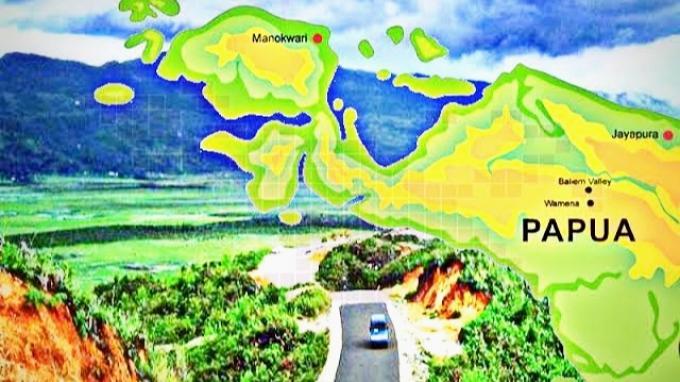Development Aims to Increase the Welfare of Papuans
By : Rebecca Marian )*
In realizing development in an Indonesia-centric manner, the Land of Papua seems to be a government priority in making it happen. Moreover, infrastructure development in Papua has spent a significant amount of budget.
The Ministry of Transportation for the last 8 years has continued to build transportation infrastructure in Papua Province in order to accelerate the realization of connectivity between regions in Papua.
The development of transportation sector facilities and infrastructure in Eastern Indonesia is of course in line with the government’s program of developing Indonesia from the periphery through a new approach to development that is Indonesia-centric in Papua.
To achieve development success in Cenderawasih Earth is of course not an easy matter, because there are many obstacles and challenges that are always in the way of implementation in the field.
Even so, the government in the Joko Widodo – Ma’ruf Amin era seemed to have never given up on improving the welfare of the people in the Land of Papua.
Until now, people in the Land of Papua should be grateful because they can enjoy the transportation infrastructure built by President Joko Widodo’s government.
The government’s policy in developing the transportation sector in Papua is due to the fact that the people living in the mountains of Papua are very dependent on air transport connectivity.
The construction of an airport in the mountains of Papua carried out by the Ministry of Transportation is also very supportive of the One Price Fuel Oil (BBM) policy throughout Papua. Before the one-price fuel policy was implemented, the fuel price was Rp. 50,000 per liter to Rp. 100 thousand/liter.
With the government’s one-price fuel policy, people in Papua can buy fuel at IDR 6,500/liter, the same as other regions in Indonesia.
Regional connectivity and mobility of people between islands in Papua is realized through the operation of sea and/or air transportation.
The Papua region which has landscape characteristics in the form of mountains, mountains, wilderness and sea coasts makes access to inland areas much easier to achieve using air transportation modes.
Currently there are approximately 389 airfields spread across almost all regencies and districts in the province.
The biggest challenge in implementing development in Papua Province is the limited transportation infrastructure that is smooth and inexpensive, which enables the people and the government to carry out their activities effectively and efficiently.
Meanwhile, Academician from the Faculty of Economics and Business, University of Padjadjaran, Prof. Poppy Rupaidah, supports the government’s efforts through the Ministry of Transportation to build inter-regional connectivity in the Regencies/Cities of Papua Province.
In addition to the transportation sector, the local government must also continue to provide encouragement to improve the quality of human resources in the Papua Province by providing native Papuan children with study opportunities at various universities and highlands.
Of course there are several obstacles to the development of transportation infrastructure in the vast territory of the Province of Papua, especially when compared to the population who live in remote and scattered areas.
Another problem faced by the government is that building Papua’s transportation infrastructure is expensive due to very difficult access, especially in Papua’s steep central mountains and swamp areas and peatlands in the south.
One of the importance of development for Papua is the high poverty rate in Papua. Until the end of 2020, the percentage of poverty in Papua was recorded at 26.8 percent. This figure refers to the number of people living in poverty in Papua, more than a quarter of the population. Of course this cannot be handled simply by providing cash assistance.
To overcome this, of course what can be done is the application of inclusive development evenly distributed on every issue. The economy is strengthened by opening various jobs, as well as improving the quality of human resources in Papua.
Basuki Hadimuljono as Menpupera said, his party took a number of breakthrough steps in infrastructure development in an integrated, precise, focused and synergistic manner with ministries/agencies and local governments.
Basuki said, to create reliable infrastructure, Kempupera is committed to implementing an equitable development program to improve people’s welfare. Then, affirmative support for increasing human resources (HR) for the people of Papua.
The Director General of Land Transportation Budi Setiyadi said that the transportation of goods is an important matter in the transportation sector. The transportation sector has an important role in the logistics system in the flow of goods movement and connectivity between regions.
Budi revealed, currently the transportation of goods using road transport is still the most dominant mode in the logistics system in Indonesia. Data from the Directorate General of Hubdat of the Ministry of Transportation noted that the role of logistics transportation via roads reached 80-90 percent, the rest used other modes of transportation.
It is noted that Indonesia’s logistics costs compared to neighboring countries are still far away, their logistics costs are more or less 12 percent, we are still at 23 percent.
This inefficiency can be reduced by infrastructure development. Therefore, the government continues to optimize infrastructure development, be it roads, ports and airports.
The need for logistics is of course very closely related to the welfare of the Papuan people, so serious development is needed to improve the welfare of the people in Papua.
)* The author is a Papuan student living in Jakarta
